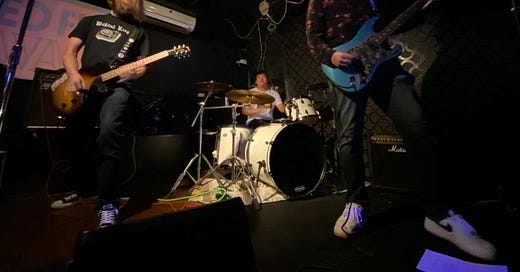This was originally written for the Undercover Soundtrack blog in 2016, in the run up to the publication of The Waves Burn Bright. The blog looks out how music influences writers, and more specifically, what they listen to while writing.
Like a lot of authors, it was music that got me into writing. It’s quite surprising (or maybe not) how many of us once harboured dreams of rock stardom. My first pennings were song lyrics but over a clichéd adolescence sitting in my room with a guitar and too many candles, I quickly realised that I wasn’t going to be the next Kurt Cobain. My lyrics morphed into poems until the urge towards narrative took hold and I turned to novels. Music never left me and has informed everything I’ve written since.
My debut novel, First Time Solo, is entirely dependent on music, both as an aspect of the story and in the writing process. The main character, Jack, is a jazz trumpeter and, while training to be a RAF pilot in 1943, starts a band with three of his comrades. Music as a social lubricant, music as a shorthand between friends, music as a means of exploring other cultures, music as language, music as the backdrop for romance and more, all these are woven through the staves of the novel but for me, writing it, music was the window to the past. Before the war starts, Jack is a teenage boy, lonely in his bedroom with only his records, the radio and his subscription to the Melody Maker to keep him company. That’s an emotional world I can inhabit, but what about the reality, the differences between the 1990s and the 1940s?
Historical fiction set after the invention of the gramophone is easier to write than that set before. Listening to a modern performance of “Greensleeves” does not immediately transport one to the Tudor court despite Henry VIII being suspected of its composition. Listen to Nat King Cole perform “Straighten Up and Fly Right” or Cab Calloway scatting through “Nagasaki” however, and you’re dropped into the bedrooms of teenagers in the 1940s with a crackling wireless and heavy 78s or the dance halls that defied the Luftwaffe. Jack’s internal monologue is seasoned with the music he loves and, in order to find his voice, I had to hear what he hears, think how he thinks. I didn’t go so far as to learn the trumpet – though I wanted to – but without jazz record shops and YouTube it would’ve been much more difficult to climb inside the mind of a teenager during the Second World War.
For my second novel, Silma Hill, things weren’t so straightforward. Set in a rural Scottish village in the 18th century, there was little music I could draw on directly. I write with music playing but modern romantic re-imaginings of period ballads didn’t give me the tone I needed, as much as I enjoy songs like The Corries “Come O’er The Stream Charlie.” For a Gothic tale of witchcraft, torture and death, I needed something stronger. I found it in Mogwai’s soundtrack to the French zombie TV drama Les Revenants. Haunting, brooding, the threat of violence never far away, yet beautiful, moving and melancholy, the instrumental tracks rising and falling like waves of emotion gave me an atmosphere in which I could build my world. Songs like “Wizard Motor” get inside your head, unsettle you and never leave. When you’re writing horror, that is the ultimate goal.
My third novel, The Waves Burn Bright, is the story of a family torn apart by the Piper Alpha disaster. It is set between 1980 and 2013 so finding suitable music was easy. During my research phase early R.E.M. tracks like “Finest Worksong” brought me back to the late ‘80s with style, jangly guitars and a political sensibility underpinning everything. The Pixies, The Sugarcubes, I gorged myself on the cream of ‘80s alternative until a thought stopped me like a scratched 12 inch. I was recreating my ‘80s, not my character’s. I switched off the music, sat back and had a chat with Carrie, my main character. It turned out she wasn’t much into music. Background radio, that was fine, but she didn’t buy music. One of those people who goes “I like that song, the one from that advert that goes ‘dum dum dum dee dah’.” Strangely this absence of music in her life – so very, very different from me – was the moment when she became whole, three dimensional, real. After that awakening the novel rolled out of me. Sometimes silence is profounder than any song.
Of course, I couldn’t let it go at that. She may not like music but that wasn’t going to stop me getting some in there. Her father, Marcus, wallowing in the misery of his recent divorce, returns to the music of his youth – Pink Floyd, Yes, and The Who.
Music, for me, is inseparable from the act of writing. It sets the mood of the piece, shapes the characters, sometimes even dictates the action. David Mitchell once swore himself off writing about music, calling it, “An excuse for me to write about writing without writing about writing.” Music isn’t a metaphor for me, it’s as vital as air. I couldn’t live without it, and I certainly couldn’t write without it.




